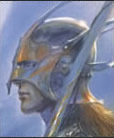Eönwë
Herald of Manwë, Banner bearer of Manwë
Eönwë was the Herald and the Banner-Bearer of Manwë. His might in arms was surpassed by none in Arda and he was one of the most important of the Maiar whose names are remembered in the histories of the Elder Days.
He started life as Fionwe, but Tolkien then stripped out the name Fionwë and replaced it with Eönwë.
Eönwë and Eärendil
It was Eönwë who called out to Eärendil, when he was in Tirion. He summoned Eärendil to come before the Valar.
War of the Great Jewels
When the hosts of the Valar came out of the West, the challenge of the trumpets of Eönwë filled the sky, and when the Silmarils were finally taken from Morgoth’s crown, it was Eönwë who took them, and guarded them.
After the end of the battle, it was Eönwë who summoned the Elves of Beleriand to depart from Middle-earth. But Maedhros and Maglor would not harken to his call, and they sent a message to Eönwë, bidding him to yield up the Silmarils, which they felt rightfully belonged to them, the remaining sons of Fëanor. However, Eönwë replied that their right had been forfeited because of their multiple and merciless deeds – especially their slaying of Dior and their assaults on the Havens. He said that he would yield the Silmarils only on the order of the Valar.
Maedhros and Maglor then crept into Eönwë’s camp and stole the Silmarils. Even then, Eönwë would not allow the slaying of the sons of Fëanor, and the brothers fled, each going to their individual dooms.
Akallabeth
Eönwë came among the Fathers of the Three Houses of the Edain and taught them wisdom, power and life more enduring than any of mortal race.
Eönwë and Sauron
When Thangorodrim was broken, and Morgoth overthrown, Sauron clad himself in fair hue and came before Eönwë. He made obeisance to the Maia, and repented his evil deeds, if only in word. While it was not within the power of Eönwë to grant this pardon, he commanded Sauron to return to Aman to receive the judgement of Manwë. However, when Eönwë departed to Aman, Sauron remained in Middle-earth, hiding himself and falling back into evil.
Notes from HoME
Eönwë started life as Fionwë, the son of Varda and Manwë, and the brother of Ilmarë. He was much loved by Tulkas, and dwelt with Manwë. He had a significant part to play in earlier versions of the Silmarillion stories, when he was still positioned as the son of Manwë. However, when Tolkien abandoned the concept of children of the Valar, Fionwë was changed into being Manwë’s herald, and it is possibly this “demotion” that led to his disappearance from much of the published Silmarillion.
War leader of the Valar
In early versions of the Battle of the Powers and the chaining of Melkor (from the Book of Lost Tales), Fionwë stood beside Manwë in his chariot, and Nornorë, then Manwë’s herald, ran before them. In the War of Wrath, it was then Fionwë who was the leader and commander of the Valar’s forces against Morgoth. A more detailed description of this conflict was given in The Lost Road:
“Here the sons of the Gods prepared for war, and Fionwë son of Manwë was their leader. The Light-elves marched under his [white] banners … the host of Fionwë was seen shining upon the sea afar, and the noise of his trumpets rang over the waves and echoed in the western woods. … Fionwë drove the Orcs and Balrogs before him; and he camped beside Sirion … Fionwë fought the last battle of the ancient world … [he] crossed Sirion and the hosts of Morgoth were driven as leaves, and the Balrogs were utterly destroyed; and Morgoth fled back to Angband pursued by Fionwë.”.
Eärendel
In the Quenta Silmarillion, the Gods sent Fionwë to the shore of Aman, to escort Eärendel’s companions to a boat so that they could leave the Blessed Realm.
The Tale of the Sun and the Moon
In the Tale of the Sun and Moon from the Book of Lost Tales, it was the Sun who was put up in the sky first under the guardianship of Urwendi (later Arien). When the Boat of the Moon was ready, Manwë sent Fionwë, swiftest of all those who moved about the airs, and asked him to bring Urwendi back to Valinor. Fionwë went rapidly, for he had conceived a great love for Urwendi many years ago, and her radiance set him aflame with the eagerness of the Gods. It seems that Tilion “took over” this portion of Fionwë’s character in the published Silmarillion.
Númenor
It was Fionwë who allowed that only elves and the men of the houses of Hador and Bëor could dwell in Númenor.
The Final Battle
In the original ending of the whole story (Manuscript C in the Book of Lost Tales), it was Fionwë who slew Melkor in a fit of rage and grief over the violation of the Sun, carried by Urwendi whom he loved:
“Fionwë Úrion, son of Manwë, of love of Urwendi [the Mistress of the Sun] shall in the end be Melko’s bane, and shall destroy the world to destroy the foe, and so shall all things then be rolled away.”
In a different version of the same ending, Túrin stood beside Fionwë in the Last Battle, and dealt Morgoth the fatal blow. By the Quenta Silmarillion, Tulkas fought with Melkor, with Fiowë on his right, and Túrin on his left.









